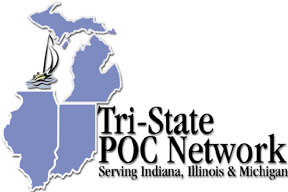|
Billing
& Reimbursement
and Connectivity
The
second meeting in 2002 of the Tri-State POC Network
serving Illinois, Indiana and Michigan took place at the
Radisson Hotel in Merrillville, Indiana on Wednesday,
August 14, 2002 from 8:30 AM to 3:00 PM.
The meeting was attended by 53 registered
healthcare professionals as well as representatives from
the program sponsors and vendors: Abbott, Bayer,
LifeScan (J&J), MAS, Roche, Ryan Diagnostics and
Telcor.
The
meeting commenced with the introduction of the core
group and opening remarks by Darlene Sobucki, founder of
the Tri-State POC Network.
Members of the core group include: Wendy Denk,
Ingalls Hospital, Harvey, IL; Theresa Kulik, Advocate
Lutheran General, Park Ridge, IL; David Noah, Palos
Community, Palos Heights, IL; Gil Salas, Univ of
Illinois Chicago, Chicago, IL; Darlene Sobucki,
Advocate Trinity Chicago and Advocate South
Suburban, Hazel Crest, IL.
Billing
and Reimbursement Presentation
Christopher
Fetters, President and founder of Nextivity Point of
Care Consulting Firm spoke to the group about POCT
Billing and Reimbursement (our thanks to Roche for
sponsoring Chris for this event.)
Chris obtained audience participation by
rewarding individuals who could correctly solve acronyms
with pieces of candy (chocolate!). The stumper: 200 D for P. G. in M. (If you guessed $200 for
passing Go in Monopoly, congratulations!)
Chris continued giving treats throughout his
presentation when people volunteered information,
definitely a way to encourage group participation.
The
presentation involved discussion of the following:
-
Should
we bill for POC testing,
-
POC
is Profitable, and
-
Improves
patient care.
Back
to top
(There
were no handouts but the presentation was made available
on www.nextivity.net.)
Lab tests have CPT codes 80000 89399 no
matter where the location or setting so a Glucose
performed at bedside should be charged as a lab test
(which would be the same for ACT, ABG, A1c, I-Stat, etc,
a total of 23 lab analytes!).
By not charging for these lab tests performed as
POCT, the
CPT
codes and charges wont be added to the lab charges
listed on the hospital cost report. Chris warned that
the Clinical Fee Schedule should not be used but to use
the Charge Master to determine charges and suggests
using NCCLS GP-11A as a guide to doing so.
Who
says POCT can be billed? Medicare and Compliance
consultants as long as the following requirements are
met: there is a CLIA certificate, a physician order,
test is reasonable and necessary for the management of
the patient and the result can be reported promptly
(needs to be available before the next test is
performed). How to bill? Either by paper or
electronically although 20% 40% of the charges are
missed in a manual paper system.
In an automated system, CDM codes can be
established for individual floors or units to capture
charges for their particular tests.
There
are three things that must be done for an efficient,
high quality and profitable POCT program:
-
Bar
code the patient and operators to avoid bogus ID
numbers,
-
Install
a data management system and
-
Bill
for POCT.
Chris
provided a formula to help members determine revenue for
POCT, which opened many eyes as just how much the
healthcare facility can recoup from even just one CPT
code. He
also stated someone from the POC Committee, Finance and
Contract Management should work together in the project.
Back
to top
Connectivity
Presentations
Following
break, the group heard connectivity presentations from Roche
(Kathleen.clemons@roche.com
and lauren.gersbert@roche.com
presenters) for the Inform/DataCare connectivity, J&J
Lifescan/DataLink (Donna Szul, Joe Eickhoff, Brenda
Behrens, Ruth Boltec and Steve Lipschutz), and Abbott
PrecisionNet
(John Ellis and Margaret Rooney) and following
lunch, two independent vendors, MAS RALS-Plus and
Telcor QML.
Roche,
J&J and Abbott provided overviews of their
respective BGM meters and test strips before proceeding
with the Connectivity discussions. To be fair to the
three vendors, only one vendor was allowed in the room
during the presentations and all had equal time.
When
asked about Web Based Training, Roche said the program
would be coming soon, Lifescan has both CD and WEB based
available and Abbott has the WEB based training
available for I-Stat and Medisense.
As
for Connectivity, Roche (DataCare) has an open system,
which means other devices may be linked to the system as
long as there is an HL7 and ASTM interface. Lifescan (DataLink) has a bi-directional interface and may be
connected via a PC Link, network or modem. Abbott (PrecisionNet)
features a walk away download and the docking stations
may be plugged into either a network PC or a network
port. Currently
Abbott can only connect to the glucose monitors but
other components are to be added.
(For more detailed connectivity information,
speak with the vendors.)
Back
to top
MAS
(RALS Plus) is vendor independent.
Connectivity currently is available for Roche and
Lifescan BGM meters, as well as Triage.
Soon to be released (currently in Beta testing)
will be I-Stat, Bayer and IL Gem Premier.
Radiometer connectivity will be released in first
or second quarter 2003. Joan
Maher and Kit
McElwain provided an in depth discussion on the more
technical aspects of connectivity as well as provide
information as to the difference between updates (no
charge) and upgrades (charge, be sure to negotiate
upgrades into the contract). For more information
visit www.medicalautomation.com.
Telcor
(QML, Mike Seaton presenting) is also vendor
independent and may be linked to Nova, IL, Lifescan,
ITC, HemoCue, Biosite, Bayer, I-Stat, Roche and a few
more (I cant read my writing, sorry). Connections may
be direct, modem or network and Data is managed by
exception (you determine the exceptions, hi/lows, etc).
For more information, visit www.TELCORINC.com.
All
presenters stated be sure to ask the vendor if their POC
devices are CIC compliant Chris Fetters suggests
reviewing the standards for connectivity through www.NCCLS.org
or the CAP checklist POCT1-A.
Back
to top
|
